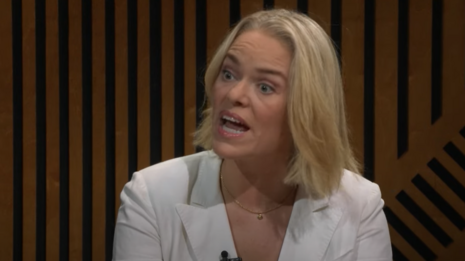 Wednesday night sounded like “Protect My Public Media” night on NPR and PBS. The News Hour tooted its own horn as some kind of nonpartisan bargain for taxpayers. NPR’s All Things Considered put on their CEO Katherine Maher for what was basically a seven-minute pledge drive for federal funding.
Wednesday night sounded like “Protect My Public Media” night on NPR and PBS. The News Hour tooted its own horn as some kind of nonpartisan bargain for taxpayers. NPR’s All Things Considered put on their CEO Katherine Maher for what was basically a seven-minute pledge drive for federal funding.
Notice PBS and NPR have never managed to display fairness and balance when it comes to their own subsidies. Conservative critics are never taken seriously. Maher managed to say something as ridiculous as her claim in her congressional testimony on March 26 that she’s never found political bias on NPR. Now she says there’s no hatred for anyone on the calm airwaves of public broadcasting:
MARY LOUISE KELLY, anchor: Just to put the question to you quite bluntly, to quote the words of Marjorie Taylor Greene, the Georgia congresswoman who was running the subcommittee hearing where I know you were just summoned to testify last month, she said, “look, you can hate us on your own dime.” To which you say, what.
KATHERINE MAHER: We don’t hate anyone in public media. We report on the news, and we encourage that we are reaching out to people from all different backgrounds, political persuasions, belief sets. And we want to be able to hear the voices of the American public reflected on public media in the same way.
Fact check: False! NPR rolled out the red carpet a week ago for an artist who spewed she was a “counterterrorist” to people opposing wokeness in government-funded museums.
In February, NPR White House reporter Asma Khalid railed against Elon Musk on PBS, saying “the world’s richest man really sort of take a hatchet that will essentially take people who are already in the depths of poverty and, you know, increase starvation rates or increase hunger rates.”
In that same week, NPR “domestic extremism correspondent” Odette Yousef found leftist experts to compare Americans opposing transgender ideology to the Nazis in the 1930s.
Authors who hate the Republican Party are granted unopposed hours on the NPR chat show Fresh Air with Terry Gross. Gross has celebrated New York Times reporter Jeremy Peters and his book Insurgency: How Republicans Lost Their Party and Got Everything They Ever Wanted, as well as Washington Post columnist Dana Milbank and his book The Destructionists: The Twenty-Five-Year Crack-Up of the Republican Party. There’s Robert Draper, who wrote Weapons of Mass Delusion: When the Republican Party Lost Its Mind. There’s Tim Miller, who authored Why We Did It: A Travelogue from the Republican Road to Hell.
They couldn’t possibly talk to Mark Levin about The Democratic Party Hates America.
Early on, Kelly weakly recounted a White House statement titled “The NPR, PBS Grift Has Ripped Us Off for Too Long.” It contained many examples of left-wing tilt. (Four studies or articles from NewsBusters were linked.) But Kelly wouldn’t provide any specifics for Maher to rebut. She just asked her to say she “stands by” NPR’s product.
MARY LOUISE KELLY: I wanna note – we have asked, the newsroom has asked the White House to comment on what their goal is here, with pulling back funding, they have not responded. They have posted on the White House website a list of NPR and PBS stories that it says represent biased content and quote, “radical woke propaganda disguised as news.” This includes stories dealing with LGBTQ issues, with coverage of race, coverage of politics. Understanding, Katherine, that many of the examples on this list date from before your tenure, does NPR stand by its journalism?
KATHERINE MAHER: Absolutely.
This formulation by journalists, that facts stated by the Trump team was “what it says,” as if you can’t possibly confirm it. This is especially prevalent when accusing the federal establishment of a leftist bias. They pretend the allegation is hard to believe. But they’re the ones who are unbelievable.














